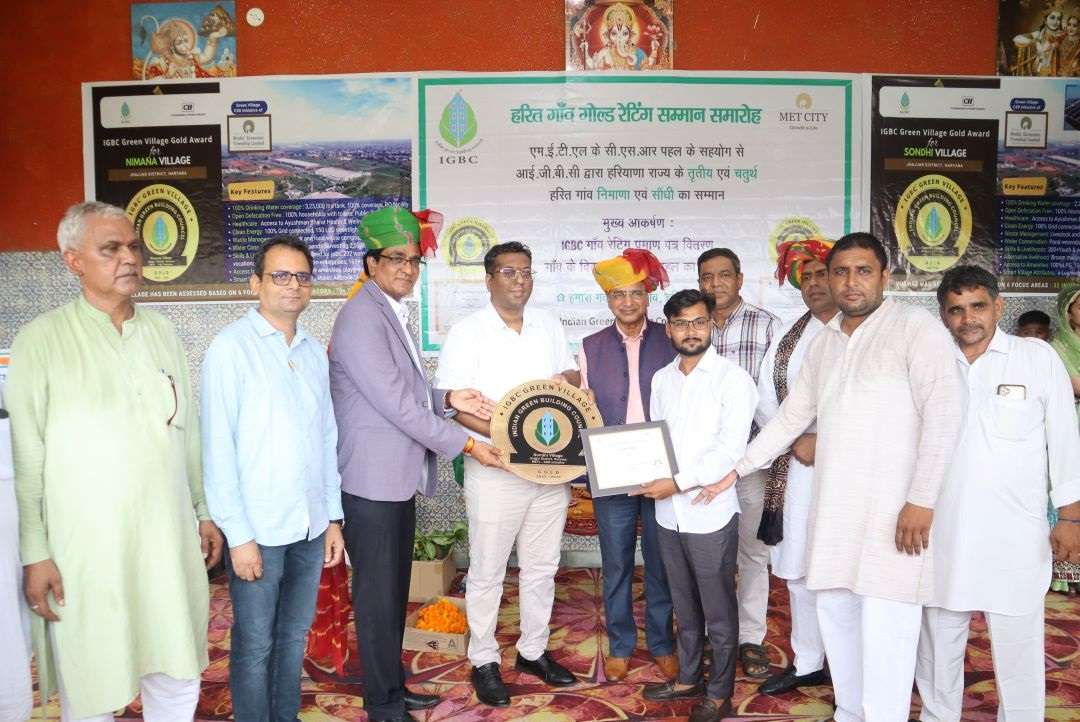The CII Indian Green Building Council (IGBC) has awarded the prestigious IGBC Green Village Gold Rating to Sondhi and Nimana villages in Jhajjar district. This recognition highlights the villages’ outstanding commitment to sustainable development and marks a significant achievement in the collaboration between Reliance MET City and the local Gram Panchayats.
The IGBC Green Village framework, which evaluates villages across six key focus areas with over 75 measurable indicators, was applied to both villages to enhance resource management, infrastructure, and livelihoods. By adopting this structured approach, Sondhi and Nimana have successfully integrated sustainable practices into the community, driving positive change and setting new standards for rural development in India.
A ceremony to honor the villages’ achievement was held in Gram Nimana, with prominent figures including Swapnil Ravindra Patil, IAS, Deputy Commissioner of Jhajjar, gracing the event as the Chief Guest. Sanjay Varshney, Chairman of the IGBC Delhi Chapter, presented the IGBC Gold Rating plaques to the heads of both villages.
Nimana village has achieved full household drinking water coverage through a 3,25,000-litre storage tank and RO system, ensuring safe and reliable supply. The community is now Open Defecation Free with universal toilet access, supported by the establishment of an Ayushman Bharat Health & Wellness Centre. Clean energy adoption has been prioritised with a 55 kWp solar PV system and 150 solar-powered streetlights, while water conservation is addressed through renovated ponds capable of harvesting 2.5 lakh litres annually. Alongside this, sustainable practices like composting livestock and food waste are helping maintain a clean environment.
In terms of livelihoods, over 170 youth and 232 women have been trained, with 20 women-led micro-enterprises now operational, contributing to economic self-reliance. Community amenities include 100% LPG coverage, accessible playgrounds, bus connectivity, and smart village facilities such as e-Learning and e-Governance services, making Nimana a model for holistic rural development.
Similarly, Sondhi village has secured 100% drinking water coverage with a 2,29,000-litre tank and RO facility, complemented by universal toilet access under its ODF status. Healthcare needs are supported through its own Ayushman Bharat Health & Wellness Centre. The village runs on clean energy from a 60 kWp solar PV system and solar streetlights, while water conservation is reinforced with a renovated pond harvesting 2.5 lakh litres annually.
Waste management initiatives include converting organic waste into manure, and livelihood efforts have created opportunities for over 300 residents, including alternative income activities like broom-making and bamboo furniture. With complete LPG coverage, community spaces, bus services, and smart village features such as e-Learning and digital literacy, Sondhi too exemplifies sustainable growth and community empowerment.
Speaking at the event, Mr Patil, IAS, Deputy Commissioner of Jhajjar, expressed pride in the achievement, stating, “The recognition of Nimana and Sondhi as IGBC Green Villages demonstrates how collaboration between communities, governance, and industry can foster sustainability and improve quality of life in rural areas.”
SV Goyal, representing Reliance MET City, emphasized the company’s commitment to creating future-ready communities. He said, “At Reliance MET, we are dedicated to promoting industrial growth that also benefits the surrounding communities. The success of Sondhi and Nimana reflects our belief that economic growth and community well-being should go hand-in-hand.”
Sanjay Varshney, Chairman of the IGBC Delhi Chapter, noted that these villages serve as models for others to emulate. “The success of Nimana and Sondhi will inspire more Panchayats across India to adopt IGBC’s Green Village Rating system, improving the quality of life for every citizen,” he remarked. This achievement places Jhajjar district on India’s map as a hub for green-certified villages and provides a practical, replicable model for sustainable rural development across the nation.
Since its inception, IGBC has been promoting sustainable building practices across India. As part of its broader initiative, over 40 villages across 10+ states, including Mawlynnong (Meghalaya), Surpur and Atul (Gujarat), Tilpat and Bhond (Haryana), and others in states like Maharashtra, Andhra Pradesh, Odisha, Rajasthan, and Tamil Nadu, have adopted the Green Village Concept. This initiative aims to provide rural India with sustainable and self-reliant development models that focus on enhancing environmental, social, and economic conditions. With growing interest in these Green Village initiatives, the model is expected to gain momentum, setting a benchmark for villages across the country to work towards more sustainable and resilient futures.







